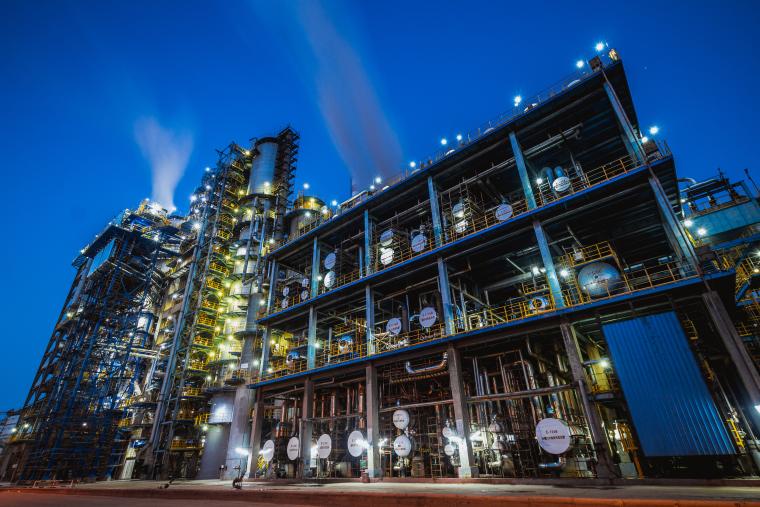The PCA-BC heavy oil high-efficiency conversion additive has been industrially applied for the first time

On June 8th, good news came from Dalian Petrochemical Company of China National Petroleum Corporation. The heavy oil high-efficiency conversion additive PCA-BC independently developed by the Research Institute of Petroleum Processing of China National Petroleum Corporation has completed industrial application calibration in the 3.5 million tons/year catalytic cracking unit of Dalian Petrochemical Company. The results show that: When the catalytic raw material resins and asphaltenes increase and the raw material properties deteriorate, when the additive reserves reach 5%, the slurry yield decreases by 2.34 percentage points, the total liquid yield increases by 2.2 percentage points, the gasoline yield increases by more than 2 percentage points, and the dry gas and coke yields remain stable, demonstrating excellent heavy oil conversion capacity and the characteristics of improving the yield of the target product. It has met the demands of the device for rapid adjustment of product distribution, reduction of slurry yield and increase of total liquid yield, and has been highly recognized by users. This marks that China National Petroleum Corporation maintains a continuous leading competitive edge in the direction of efficient conversion AIDS for heavy oil in catalytic cracking.
Catalytic cracking units have always been the most important source of profit for refineries. How to further improve the efficiency of the unit under the condition of heavy and inferior raw materials has always been a focus of high concern for refineries. Heavy oil high-efficiency conversion additives have the advantage of rapidly improving the operation level of catalytic cracking units and are an important choice for refineries to meet production demands.
The Research Institute of Petrochemical Industry has been engaged in the research and development of in-situ crystallization type catalytic cracking series additives for kaolin. In response to the challenges of rapid catalyst deactivation and reduced yield of target products caused by the deterioration of raw materials, on the basis of its original profound technical accumulation, it has further broken through the internal diffusion resistance of heavy oil macromolecules on the catalyst, strengthened mass transfer diffusion and the utilization rate of active centers The new generation of in-situ crystallized heavy oil conversion additive PCA-BC has been iteratively upgraded. The PCA-BC additive is prepared with kaolin as the main raw material and has significant advantages and characteristics such as high content of active components, high dispersion and full exposure on the carrier surface. The molecular sieve content of the additive is as high as over 45%, which is 1.3 times that of the conventional catalyst. The specific surface area is 500m²/g, which is 1.8 times that of conventional catalysts. Advanced "pre-set heavy metal capture traps and blocking heavy metal isolation wall coatings" technology has been developed, which has increased the anti-heavy metal pollution performance by more than twice. The PCA-BC additive was successfully industrialized in 2024, and all indicators of the additive reached the pilot-scale level. With the strong support of Dalian Petrochemical Company, the PCA-BC additive carried out its first industrial test on the company's 3.5 million tons/year catalytic cracking unit. After more than six months of repeated trials and verifications, the industrial calibration was completed recently, fully meeting the expected effects and index requirements, marking a complete success in industrial application.
The successful application of the PCA-BC additive this time has laid a solid foundation for building a high-end additive brand of China National Petroleum Corporation, provided a demonstration effect for further expanding its application, and accumulated valuable user word-of-mouth. This is one of the significant achievements made by the research team under the personal guidance of Academician Gao Houqiang since the establishment of the Academician Gao Houqiang Workstation at the Petrochemical Research Institute. It provides a good demonstration for improving the performance and increasing the efficiency of traditional oil refining catalysts through technological innovation.
